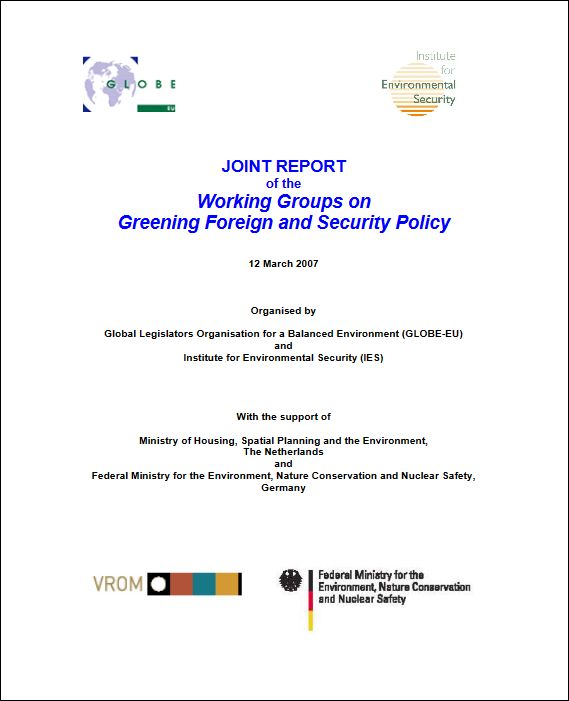Joint Report of the Greening Foreign and Security Policy Working Groups

The Joint Report of the Working Groups on Greening Foreign and Security Policy was finalised in March 2007 taking into account the results of the December 2006 GFSP Conference in Brussels and other inputs from the participants in the groups during 2006.
The Working Groups, co-organised by IES with GLOBE-EU, are an informal gathering of experts from international and intergovernmental organisations, European Union Institutions, national governments, specialised institutes, universities, NGOs and the private sector.
Working Group discussions between experts and policy officials dealt with the linkages between environment, security and sustainable development in four stages of the conflict cycle:
Group A: Predicting Instability - Monitoring, risk assessments and early warning in vulnerable areas and measures to avoid conflict.
Group B: Preventing Conflict - Policy instruments and measures for areas of escalating tensions and for conflict prevention (military and non-military).
Group C: Managing Conflict - Crisis management and resolution in the event of conflict (military and non-military).
Group D: Recovery and Transition - Post conflict restoration, reconstruction and structural adaptation.
Publication website ( Webpage - www.envirosecurity.org )
| Author(s) | Institute for Environmental Security |
| Publisher | Institute for Environmental Security |
| Place published | The Hague |
| Date / Journal Vol No. | 12 March 2007 |
| Pages | 45 |
Related Organisations
- Global Legislators Organisation for a Balanced Environment - GLOBE-EU
- Institute for Environmental Security (IES)
Themes
1 - ES and foreign and security policy (Mainstreaming environmental factors into foreign and security policy including energy and food security, and security related to other resources such as land, water, living marine resources, terrestrial biodiversity)
2 - ES and development cooperation (Mainstreaming conflict prevention and livelihood protection into development cooperation especially in conflict prone and conflict affected countries, for example, through payment of ecological services and equitable benefit-sharing mechanisms)
3 - ES and peace building (Environmental cooperation for peace building such as through peace parks, river basin management initiatives and cooperation over degraded and environmentally-stressed resources in conflict-prone and conflict-affected zones)
4 - ES monitoring, mapping and early warning
5 - ES risk and needs assessment and management
6 - Environmental conflict prevention and resolution
7- Post-conflict environmental rehabilitation and reconstruction
8 - Natural disasters and climate change mitigation and adaptation
Subjects
CLI Climate
DEV DEVELOPMENT
ENV ENVIRONMENT
PEA PEACE / SECURITY